Books
Elisabete Martins
Call interns OECD CFE EDS 2022 - application deadline July 2022
Dear Sir or Madam,
the OECD Centre for Entrepreneurship, SMEs, Regions and Cities is looking for highly qualified and motivated students with a strong quantitative background to do a research-oriented internship in its Economic Analysis unit.
Candidates should be nationals of a OECD member country and be enrolled in a full-time graduate degree programme (Master or PhD) for the entire duration of the internship in economics, quantitative geography, or related fields (PhD level is strongly preferred).
We encourage candidates willing to apply their analytical skills in a policy context and to better understand what supports SMEs, entrepreneurship, regional, urban, rural and local development to submit their application.
For more information please consult the internship call here (also attached). The application deadline is 10th of July 2022.
--
The Economic Analysis Unit of the OECD Centre for Entrepreneurship, SMEs, Regions and Cities
Associate Director - Government Finance Research Center (GFRC) (Job ID #167729)
The Government Finance Research Center (GFRC) at the University of Illinois Chicago is seeking to fill its Associate Director position. The candidate should have research experience with a focus on government finance and budgeting.
The GFRC webpage is here: https://gfrc.uic.edu/
The job posting is here: https://jobs.uic.edu/job-board/job-details?jobID=167729&job=associate-director-government-finance-research-center-gfrc&fbclid=IwAR1omatzOSt1zncDyyqso-Mg5Lv03fsPvW03K7go5-fFO553WiE5Ivk4nk0
Description: This position is responsible for designing, conducting and managing research in the Government Finance Research Center’s (GFRC) priority areas; initiating and supervising new scholarly & research projects; strategic planning and development of new research programs.
Duties:
- Lead GRFC research agenda
- Develop intellectual agenda for GFRC research program.
- Design, conduct, and coordinate research on GRFC initiatives “core priority areas,” etc.
- Coordinate Faculty Advisor Panel in the design of research activities.
- Analyze findings, write research reports, and present research findings to public audiences, policymakers, scholarly audiences and funders.
- Pursue external funding for GFRC research including developing relationships with funders, writing grants and coordinating applications with grants and contracts staff people.
- Develop & promote relationships with peer research organizations in mutually beneficial ways.
- Support all GFRC research agendas
- Meet with faculty to provide scholarly support for research.
- Coordinate dissemination of GFRC & faculty advisory panel research in ways that impact local, state, and national policy.
- Advancement
- Meet with external constituencies to promote and advance Center priorities.
- Develop & manage relationships with potential funders and donors.
- In consultation of the Director, create, implement, coordinate and support GFRC External Advisory Panel.
- Develop relationships with potential panel members including public officials, scholars, and funders.
- Plan and coordinate External Advisory Panel meetings
- Represent GFRC at campus and non-campus meetings
- Perform other related duties and participate in special projects as assigned.
To apply, please visit: https://jobs.uic.edu/job-board/?start=1&per=5000 and Job ID: 167729 and upload a cover letter, CV and the names and contact information for three references by June 23, 2022.
Qualifications:
A minimum of a Master’s degree required ABD (pre-doctoral) in Public Administration, Public Affairs, Urban Planning, Economics, Political Science with a focus on government finance and budgeting PhD preferred.
Relevant experience in research-based organizations required. Preferably in either university, foundation, or nonprofit or civic organization.
Experience in research on government finance and budgeting, or related field.
Strong writing and communication skills, ability to supervise staff, plan and manage budgets.
Preference for demonstrated communications skills, such as publications, demonstrated experience in staff management and budget preparation.
The latest issue of Papers in Regional Science are available! Volume 101, Issue 3, June 2022
|
Papers in Regional Science Pages: 513-768 June 2022 |
ISSUE INFORMATION
![]() Free Access
Free Access
Pages: 513-514 | First Published:12 June 2022
FULL ARTICLES
![]() Open Access
Open Access
Can regional policies shape migration flows?
Augusto Cerqua, Guido Pellegrini, Ornella Tarola
Pages: 515-536 | First Published:02 March 2022
Spatial heterogeneities, institutions, and income: Evidence for Brazil
William Y. N. Suzuki, Marcio P. Laurini, Luciano Nakabashi
Pages: 537-571 | First Published:01 March 2022
Simón Sánchez-Moral, Mário Vale, Alfonso Arellano
Pages: 573-602 | First Published:17 March 2022
Aneta Masternak-Janus
Pages: 603-618 | First Published:14 February 2022
Information communication technology and manufacturing decentralisation in China
Tinglin Zhang, Bindong Sun, Wan Li, Huimin Zhou
Pages: 619-637 | First Published:22 February 2022
![]() Open Access
Open Access
The Mediating Role of Urbanization on the Composition of Happiness
Cristina Bernini, Alessandro Tampieri
Pages: 639-657 | First Published:18 March 2022
![]() Open Access
Open Access
Shooting down the price: Evidence from Mafia homicides and housing prices
Michele Battisti, Giovanni Bernardo, Andrea Mario Lavezzi, Giuseppe Maggio
Pages: 659-683 | First Published:26 February 2022
![]() Open Access
Open Access
Spatial dependence in the technical efficiency of local banks
Carmelo Algeri, Luc Anselin, Antonio Fabio Forgione, Carlo Migliardo
Pages: 685-716 | First Published:17 March 2022
Political competition, spatial interactions, and default risk of local government debts in China
Cong Yu, Linke Hou, Yuxia Lyu, Qi Zhang
Pages: 717-743 | First Published:01 March 2022
Jindo Jeong, Jiwon Lee, Tae-Hyoung Tommy Gim
Pages: 745-765 | First Published:01 March 2022
BOOK REVIEW
Martijn J. Smit
Pages: 767-768 | First Published:18 March 2022
Assistant Professor / Postdoctoral Researcher in Science of Science at the University of Warsaw - 3 positions available
The University of Warsaw is recruiting three Assistant Professor or Postdoctoral positions in Science of Science (including: scientometrics, research policy, science policy, sociology of science, economics of science or science and technology studies). Details are available here: https://www.lbn.uw.edu.pl/job-opportunities
Closing date for applications: June 29, 2022 (Warsaw time).
2022 RSAI Fellows and RSAI Newsletter (May 2022)
Dear RSAI members,
I hope this email finds you all well.
With the summer season about to start in the Northern Emisphere, the RSAI and its numerous sections all over the world keep running their daily activities.
It also gives me great pleasure to write you to deliver great news. The following four colleagues have been appointed Fellows of the RSAI:
- Prof. Genevieve Giuliano ( University of Southern California)
- Prof. Budy Resosudarmo (Australian National University)
- Prof. André Torre (University Paris-Saclay)
- Prof. Frank Van Oort (Erasmus University Rotterdam)
The committee in charge of pre-selecting candidatures, made up by this year by Prof. Kyoshi Kobayashi (Chair), Prof. Janice Madden, and Prof. Alessandra Faggian, whom I'd like to thank, received several very good candidatures. The committee suggested to process five of them, and the four names above turned out to pass the threshold for being elected based on the votes by other Fellows. Congratulations to the new Fellows on their outstanding achievement! The RSAI will count on them for mentoring future regional scientists and supporting the growth of the discipline and the association.
Let me also take the chance to send you the latest issue of the RSAI Newsletter (download), skillfully edited by Martijn Smit (University of Utrecht) and Mina Akhavan (Politecnico di Milano). The Newsletter brings you the latest news about the Associations' activities, while also introducing Roberta Capello's experience as an RSAI Fellow, hosting a chapter in Peter Batey's history of European Regional Science congresses, showcasing an interview to Andreas Diemer, who won the 2021 RSAI Dissertation award, and much more content. I am confident you'll enjoy the read.
Lastly, let me remind you all of the discounts for RSAI members to publish their articles, if accepted, in Open Access format on Papers in Regional Science and Regional Science, Policy and Practice. For the former, Authors face an APC of 3,550 USD/ 2,350 GBP/ 2,950 EUR for every accepted article, but this abates to 1,500 USD/1,000 GBP/1,250 EUR for RSAI members. For RSPP, APCs are equal to 2,550 USD/ 1,700 GBP/ 2,150 EUR for non-members, and 1,500 USD/1,000 GBP/1,250 EUR for RSAI members. This is yet another advantage from being a member of our association.
I thank you all in advance for your attention, and I look forward to seeing many of you soon at one of the many future RSAI events.
Kind regards,
The latest issue of Regional Science Policy & Practice are available! Volume 14, Issue 3, June 2022
|
Regional Science Policy & Practice Pages: 485-693 June 2022 Issue Edited by: Gonçalo Marcelo, Nuno Ornelas Martins, Francisca Guedes de Oliveira |
ISSUE INFORMATION
![]() Free Access
Free Access
Pages: 485-486 | First Published:02 June 2022
INTRODUCTION
Space, time and political economy
Gonçalo Marcelo, Nuno Ornelas Martins, Francisca Guedes de Oliveira
Pages: 487-489 | First Published:02 June 2022
ORIGINAL ARTICLES
The spatial–temporal web of the Inhabited City
Maria Filomena Molder
Pages: 490-502 | First Published:15 December 2021
Space and innovation: A sociological view from below
José Madureira Pinto
Pages: 503-512 | First Published:13 September 2021
Unsatisfying ordinalism: The breach through which happiness (re)entered economics
Gabriel Leite Mota PhD
Pages: 513-528 | First Published:21 October 2021
Timescapes and the vernacular language of Cuba’s popular economies
Oskar Lubiński
Pages: 529-538 | First Published:26 October 2021
João Vasco Coelho
Pages: 539-559 | First Published:28 September 2021
Sustainable public procurement in Portugal: The case of two public school canteens
Sofia Bizarro, Maria de Fátima Ferreiro
Pages: 560-574 | First Published:23 December 2021
ORIGINAL ARTICLES
Regions’ economic fitness and sectoral labor productivity: Evidence from Turkey
Ibrahim Tuğrul Çınar, Ilhan Korkmaz, Tüzin Baycan
Pages: 575-598 | First Published:31 March 2022
Commuting to work in cities: Bus, car, or train?
Amitrajeet A. Batabyal, Hamid Beladi
Pages: 599-609 | First Published:03 March 2022
![]() Open Access
Open Access
Linking spatial economics and sequencing economics for the Osaka tourism agglomeration
Akifumi Kuchiki
Pages: 610-626 | First Published:16 September 2021
Celebrities and GreenSphere tourism
Sérgio Nunes, Philip Cooke, Fábio Tomaz
Pages: 627-643 | First Published:13 July 2021
![]() Open Access
Open Access
Gender differences in weight status and early school leaving in Italy
Adriana Barone, Cristian Barra
Pages: 644-666 | First Published:27 October 2021
Spatiotemporal analysis of regional inflation in an emerging country: The case of Indonesia
Harry Aginta
Pages: 667-688 | First Published:24 April 2022
BOOK REVIEWS
Amitrajeet A. Batabyal
Pages: 689-690 | First Published:08 April 2022
Michael S. Delgado
Pages: 691-693 | First Published:19 April 2022
Roberta Capello
I was born nearly sixty years ago in Milan. My father was a Professor of Mechanical Engineering at Politecnico di Milano. For this reason, I grew up 200 meters away from the main building of the University where I now work. My primary school was (and still is) in the same square of the Politecnico, and during my childhood, I spent my afternoons in spring riding my bike with my little friends around the campus square. If someone had told me in those days that I would have got a position at that University, I would have just laughed.
|
The campus square with the primary school on one side |

Politecnico di Milano’s main building on the other of the campus square |
My contact with the academic world started when I was a child. I liked visiting my father’s office, looking at the “grown-up students” with admiration and looking at the “magic” events that were taking place during my visits to the technical laboratories. During my primary school years, I also got in contact with the “1968 students’ revolution”. In Milan, the Politecnico’s square was, unfortunately, a place of fights between students and police. For me, the bad side of that historical moment was that I was confined at school, waiting for the situation to improve and for my parents to pick me up.

1968, in the campus square after a day at school.
When the time to choose the University course of study came, it was not easy. I had clearly in mind what I did not want to become, and instead, I had no idea of what I wanted to become. After deep reflections and a certain influence on people thinking practically, I preferred to choose a course of study with better job opportunities. My choice was Economics at Bocconi University in Milan. The doubts were so significant that made me apply on the afternoon of the deadline.
My love for Regional Economics came during my last year when I decided to attend this course. I was deeply fascinated by how space is inextricably bound up with economic activity. Regional Economics has been the only course in all my student career where I received a “cum laude” mark and decided to write my dissertation in the field of Regional Economics under the supervision of Roberto Camagni.
The day after my graduation, Roberto Camagni asked me if I wanted to help him develop some research projects while I was looking for a highly remunerative job in the private sector. I accepted, and on September 1st, 1986, I started working in the Economics Department at Bocconi University while looking for a stimulating and remunerative job in banks, insurance companies, and large firms, where I had several job interviews. I was offered several opportunities, but none was assessed to be the right one.
In 1991, a young and already famous Dutch professor, Peter Nijkamp, met me at a conference and asked me whether I would be interested in doing a PhD at the VU University in Amsterdam. Confronted with such an offer, I understood why I could not find the right job elsewhere. I had already my preferred (even if not highly remunerated) job, and the PhD was the opportunity of my life I was waiting for. In 1991 I started with enthusiasm my studies at the VU in Amsterdam. In December 1993, I received my PhD in Economics at the VU with a thesis entitled “Spatial Economic Analysis of Telecommunication Externalities”, published the following year by Avebury. The personal satisfaction I received from the dissertation and the book was unbelievable, and I still have a vivid memory of the day of the ceremony and the day the book came out.
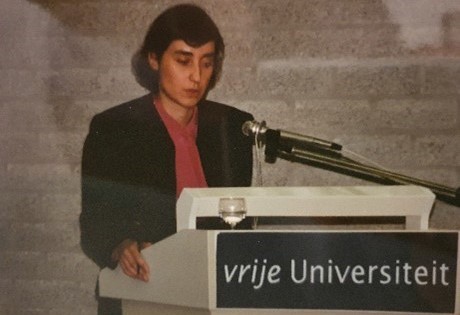
1993, PhD defense, VU, Amsterdam.
I became an assistant professor at Politecnico of Milano two years later, and another turnaround in my life happened. Roberto Camagni left the University of Padua and joined me at the Economics department of Politecnico di Milano. At last, we were both in the same academic environment, a condition that allowed us to build a Regional Science group made of enthusiastic young scientists working with us. Since that year, the number of new and innovative research fields that I had the chance to study multiplied. I still kept my passion for regional innovation models, but I opened my mind to other fields. In my first years at Politecnico, I reinforced my empirical (econometric) expertise, fascinated by the idea of “measuring the unmeasurable”. The industrial atmosphere of the industrial districts (at that time a crucial theory of local development), the collective learning effects of the milieu innovateur theory (an evolutionary approach to the development of local production systems), network externalities of the city network theories, found quantitative proofs of their effects in my studies. In this vein, I also got fascinated by Urban Economics, revisiting all attempts made to measure the presence of agglomeration economies, innovating conceptually also by finding reasons on how to overcome the “Optimal city size theory”, demonstrating that the functions and the capacity of cities to be part of a city system rather than the size explain agglomeration economies.
In 1998, I applied to become an Associate professor. I got the position in the South of Italy, and a new adventure started. I spent three years in Campobasso (or better, travelling from and to Campobasso nearly every week), an experience that forged my physical and mental health. At the University of Molise (in Campobasso), I had to teach for the first time in my life Regional Economics; I discovered the poverty of the textbooks in Italian in that discipline. Only one textbook existed, a translation of Armstrong and Taylor’s “Regional Economics and Policy” textbook, which suffered from being out of date and lacking, for example, all the local development theories developed in recent times. After one year, I signed a contract with the publisher “Il Mulino” to write a new textbook. I still remember the three tough nights I had after signing the contract, wondering if I had asked myself too much.
I wrote my textbook during my winter and summer holidays for a few years. I read original papers of economists like the neoclassical Borts and Stein, the Keynesian North, just to mention a few of them, not to speak about the fascinating books of Walter Isard. During those readings, I discovered aspects against general beliefs, like the capacity to interpret regional divergence of the original neoclassical model of regional growth in its two regions - two sectors version. In 2004, the textbook “Economia Regionale” was at last published, and I lived another period of profound enthusiasm and deep satisfaction like the ones after the PhD and the publication of my first book. In the following years, the book was translated into English (Routledge, 2007) and Chinese (Economy and Management Publishing House, 2014), and new editions both in Italian and English followed ten years later. After writing the textbook, deduction and abstraction characterised my research projects much more than before, and I was able to produce conceptual approaches to regional innovation and regional development.
In 2003, I became a Full Professor in Regional and Urban Economics at Politecnico di Milano. Among many scientific activities I developed, I like remembering a particular one. Together with Roberto Camagni and our group, I developed the MASST model, a Macroeconomic Regional Growth model, which is now in its 5th version, thanks to Andrea Caragliu and Roberto Dellisanti. It is now known at the EU level as one of the models to build scenarios at the regional level, competing with the other few that exist - RHOMOLO, REMI, GMR – each with its specificities. Its success has been impressive and much beyond our expectations if one thinks that behind models like this one, you usually find a team of at least 15 scholars. Each MASST version has instead been produced by max 3 of us!

2005, With Roberto Camagni, ERSA Conference, Amsterdam
Being a Full Professor, I thought that the difficult and challenging times had finished and that I could go on enlarging my knowledge and enjoying my research activities with Roberto Camagni and my young colleagues. I was wrong. In 2006 I received a phone call from Peter Nijkamp telling me that he was in Milan together with Roger Stough (at that time President of RSAI) and they needed to talk to me. I invited them home for dinner, and they asked me if I would be interested in becoming the next RSAI President. I have a vivid memory of what went through my mind at that moment: at first, I thought they were joking, then that they had not clear in their mind what they were saying. To my surprise, they were extremely serious, and they knew perfectly what they were saying. After one week of insufficient sleep (like the ones after signing the contract for the textbook), I accepted. In 2007, in Vancouver, the RSAI Council elected me President of RSAI: a 45 years old woman, not entirely confident about her capacities to lead an Association of that size and complexity.
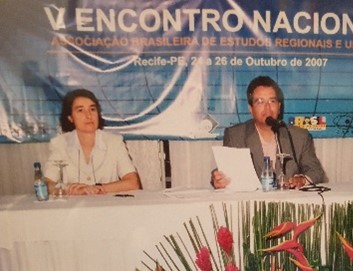
2007, National Conference of the Brazilian Association, Recife, Brazil.
Instead, two wonderful and pleasant years followed my election. I concentrated my efforts in Latin America, creating a new association in Colombia, reinforcing the just born Brazilian one and opening opportunities in Argentina (where the association was created in the following years). I re- established contacts with national associations in Europe, organised a World conference in Timisoara (Romania), and reinforced the linkage with ERSA. Finally, I modernised the rules of governance of the association, revising the constitution. But especially, I travelled all over the world, always meeting fantastic people and making new friends.
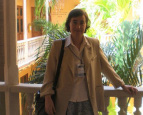
2009, Cartagena dos Indios, Colombia.
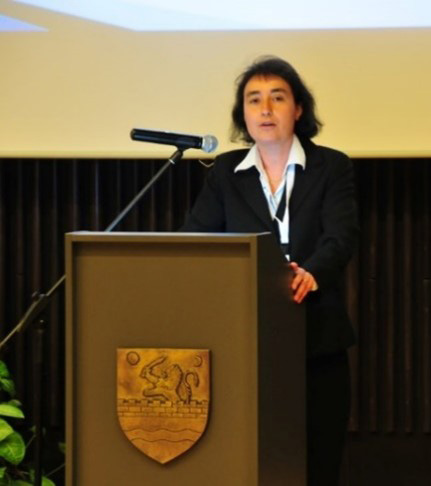
2012, RSAI World Conference, Timisoara.
As time passed, my activities enlarged to those of a member of scientific boards of research programmes, evaluation committees of research centres, President of a university course of study and Deputy Director of my Department. However, my heart is inextricably bound with scientific research. I particularly enjoy the scientific brainstorming with my young, constructive and dynamic research group that, over time, has arisen around Roberto and myself: Andrea Caragliu, Silvia Cerisola, Ugo Fratesi, Camilla Lenzi, Giovanni Perucca, Elisa Panzera and Roberto Dellisanti have developed important research fields together with Roberto and myself, with scientific rigour, creativity, competence and dedication. I hope they will have a satisfactory, full, happy, and constructive professional life like mine. I have to say that I have found the stimulating (even if not highly remunerative) job I was looking for after graduation.
(Published on RSAI Newsletter 2022 May)
RSAI Newsletter (May 2022)
Dear RSAI members,
I hope this email finds you well.
I am pleased to write you to send you the newest issue of the RSAI Newsletter (download).
Enjoy the read, and please do not hesitate to get in touch with Martijn (This email address is being protected from spambots. You need JavaScript enabled to view it.) and Mina (This email address is being protected from spambots. You need JavaScript enabled to view it.) to propose new material for the newsletter.
Kind regards,
ERSA Monthly E-news - May 2022
|
Call for Extended Abstracts/Papers - Invited Speakers - XLVII International Conference on Regional Science, Granada, October 19-21, 2022

Dear colleagues,
The Organizing Committee and the Scientific Committee of the XLVII International Conference on Regional Science (Granada, October 19-21, 2022) would like to inform you about the participation, as keynotes speakers: Andrés Rodríguez-Pose, from London School of Economics and Richard Shearmur, from McGill University – Université de Montréal.
Also remind you that the submission of extended abstracts (of at least 1500 words) or complete papers for all sessions will be open until June 15, 2022, and will be uploaded to the members’ area with the model that you will find here. You can download the abstract template and more information about the congress here.
We look forward to your participation and see you in Granada.
A cordial greeting,
The Organizing Committee
About Us
The Regional Science Association International (RSAI), founded in 1954, is an international community of scholars interested in the regional impacts of national or global processes of economic and social change.

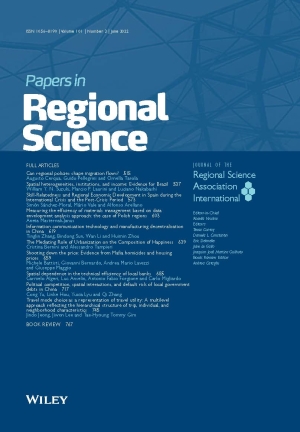


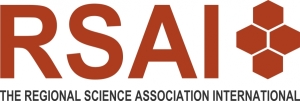
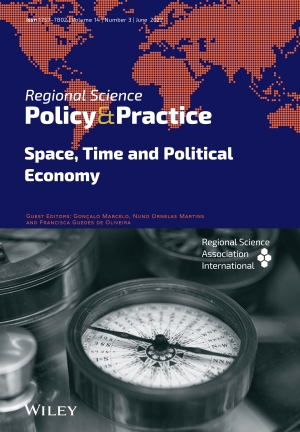

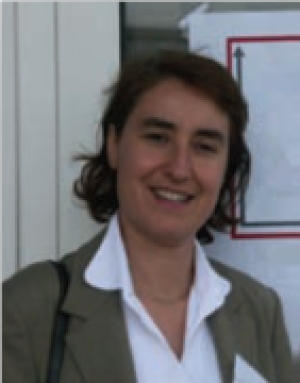

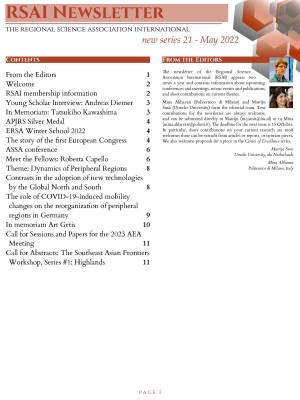
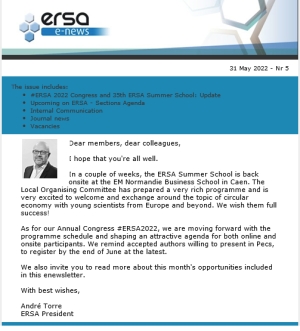

 Dear members, dear colleagues,
Dear members, dear colleagues,
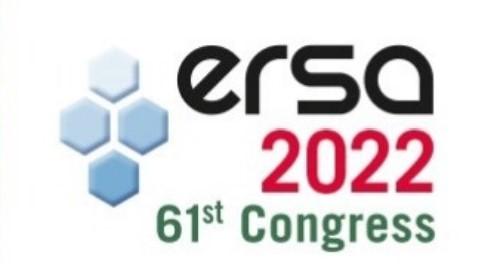 This year's edition the Congress will start on Monday 22 August with an online format for two days. It will include online keynote sessions, roundtable and online parallel sessions.
This year's edition the Congress will start on Monday 22 August with an online format for two days. It will include online keynote sessions, roundtable and online parallel sessions.













